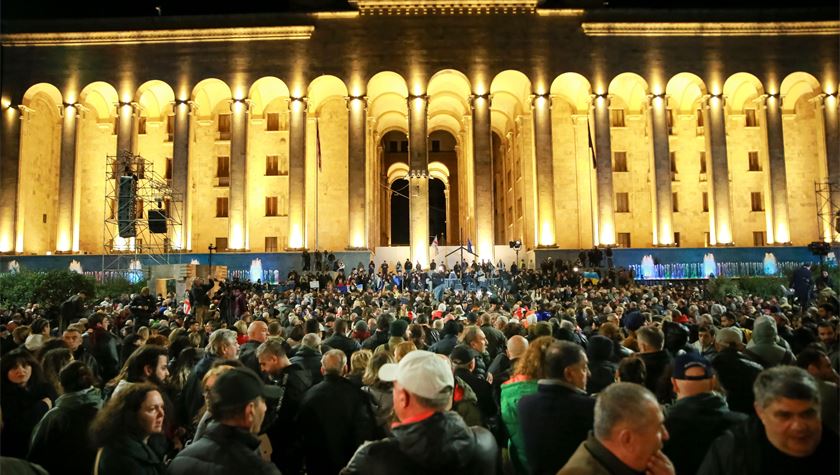Mass protests in Tbilisi
The opposition continues its mobilisation every night, denouncing the vote manipulations that would have led to the new success of the pro-Russian Georgian Dream. Documents are being collected for an international enquiry, while the outgoing government remains in a wait-and-see position, pointing to divisions between the parties and not believing in their ability to truly involve the population in the protest.
Tbilisi (AsiaNews) - Since the evening of November 4 there have been protests by the opposition in Tbilisi against the falsification of last October's parliamentary elections, which with 53.9% of the vote gave victory for the fourth time to the Georgian Dream party of the pro-Russian oligarch Bidzina Ivanišvili, called by opponents ‘the Kremlin's puppet’.
The rallies on Rustaveli prospekt, in front of the parliament building, were addressed by the leaders of the ‘Coalition for Change’, media-manager Nika Gvarami, and businessman Mamuki Khazaradze of ‘Strong Georgia’, with messages from prison from former president Mikhail Saakašvili, founder of the National Movement, reported by one of the party leaders, Georgij Vašadze.
The protesters' demands are for the elections to be declared invalid and for them to be rerun, thus deeming the new parliament illegitimate, and promising to broaden and intensify the popular opposition front, setting themselves increasingly specific goals. In the meantime, more and more documentation will be collected to be submitted to an international investigation, leading to the conviction of those guilty of falsifications, and complaints have already been filed for more than two thousand seats. As Nika Melia, another Coalition leader, put it, ‘the protest will be without end and we will be in the streets every day until the fall of this regime’.
A group large enough to prevent anyone from entering will remain in front of the palace, but the rallies will not only be on Rustaveli prospekt, where a mass of 4-5 thousand people initially gathered, blocking traffic throughout the centre of Tbilisi. The demonstrations are also supported by President Salome Zurabišvili, a leading figure in the rejection of the election results, who in turn accused the Georgian Dream of ‘stealing votes’, prompting reactions from Prime Minister Iraklij Kobakhidze and the outgoing speaker of parliament Šalva Papuašvili, who deny any irregularity in the counting of votes.
On 5 November, the demonstrations moved to the capital's Court of Appeals, while a rally had been announced at the Sports Palace, following the decisions of the regional courts of Tetritskaro and Gori to annul the voting in 30 polling stations, which will now be assessed on appeal.
As the representative of the Nabidži student movement, Luka Čokhonelidze, put it, ‘Ivanišvili tried to build a picture of the country whereby those who had taken to the streets in March against foreign agents voted for them’, but now they want to prove ‘the genuine will of Georgians without tricks’, such as call-centres and votes for other people, with which at least 400,000 votes were allegedly taken away from the opposition, ‘especially by falsifying those of citizens abroad’.
Zurabišvili pointed out that 300 thousand emigrants voted in Moldova, guaranteeing Maia Sandu's victory, while ‘this possibility was only granted to 34 thousand Georgian citizens, in a serious violation of the constitution’.
Vašadze assures that ‘more and more organised and planned initiatives will be taken, which will lead us to the final victory’, finally uniting all opposition forces under the slogan ‘it is not my protest, it is our protest, in which everyone's contribution counts’.
One of the most influential representatives of the ruling majority is the mayor of Tbilisi, Kakha Kaladze, who addressed scornful words to the opponents: ‘They have been destroyed and annihilated, what waves of protest can Gvarami or Khazaradze ever organise... they cannot even agree on social media: those who want to go one way, those who plan to pitch tents on the other, they are laughable compared to the 1.120 million people who voted for a better future’. Kaladze also criticised the behaviour of the president, who refused to come to the prosecutor's office to give testimony on the ‘alleged falsifications’.
The government and members of the Georgian Dream maintain a wait-and-see position, not believing in the ability of the opposition to truly engage the population and not wanting to offer reasons to exacerbate the conflict.







.png)










